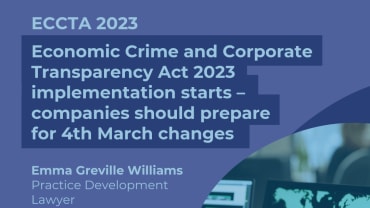Rock'n'rolla (provided nobody ever controls yer)
As far as private companies are concerned, there is no contest. If you want to give employees tax-efficient equity in your business, the most popular arrangement by a country mile involves granting EMI options.
EMI options (or Enterprise Management Incentives) have been on the statute books for nearly two decades and their popularity remains undiminished. They are the Rock Star, the Rolls Royce of tax efficient options - almost the perfect recruitment, retention and incentivisation tool.
Provided certain HMRC requirements are met, a key requirement being that the company is 'independent' i.e. not under the control of another company, then EMI options have a number of advantages over shares, the main ones being cash flow and flexibility.
Employees do not need to pay anything for the grant of an EMI option and if the EMI option is only capable of being exercised when the company is sold, it is possible to fund the exercise price out of the proceeds realised from the sale of the resulting option shares.
Do you want fries with that?
The inherent flexibility around how EMI options can be structured mean that their terms can be tailored to meet the unique circumstances of each company.
Do you want to impose performance targets linked to the company's strategic direction? Certainly sir,not a problem. Do you want to be able to lapse options on cessation of employment thereby freeing up share capital to provide future incentives? Coming right up.
There are very few prescriptive requirements in the EMI legislation relating to the option terms.
Familiarity breeds contempt
EMI options have been around so long now that everyone just assumes they are straightforward. Sadly this is not necessarily so. Operating durable and legally watertight EMI options is much less straightforward than you might think.
Over the years I have done more EMI work than you can shake a stick at; from granting EMI options, all the way through to exercise.It is mostly in the context of a deal, when a company is being acquired and I am reviewing their EMI options, that the problems come to light.
I don't know whether it is poor advice, shoddy documentation, neglect or plain ignorance but there is nearly always something wrong with the EMI options that have been granted.
I spend a huge amount of time trying to make good faulty EMI options drafted by other people.
In the context of a deal, examples of faulty EMI stuff includes:
- Granting options outside of the HMRC valuation window (technically this makes the options not EMI)
- No valuation confirmation from HMRC (ditto)
- Unclear or badly described financial performance targets (normally leads to lots of head scratching about the correct number of vested EMI option shares)
- No clear statement that the options are indeed intended to be EMI options (pretty fundamental)
- EMI options that have been badly amended jeopardising their tax status (you can't just amend stuff willy nilly, there are consequences)
- Lack of clarity around exactly when options can be exercised - pre or post-completion? (normally you want options to be exercised immediately prior to completion)
- Working time declaration has not been signed by the employee (has the potential to invalidate the tax status of the EMI options)
- Poor record keeping generally, e.g. no annual returns, no evidence of notification of grant to HMRC (how else is HMRC supposed to know that EMI options exist?)
- Granting options at a discount to market value and not understanding the income tax implications of so doing (how should the income tax be withheld and what about employer NICs?)
- Ensuring that the EMI options can be exercised on a cashless exercise basis (much easier than finding the exercise monies upfront)
I could go on but you get my drift.
EMI options are a creature of tax law and practice and so require regular attention to make sure they deliver both economically and fiscally. Companies should be taking regular and correct advice from a dedicated share plans expert.
Restrictions on EMI option shares
For example did you know that HMRC have updated their policy and practice in relation to tax advantaged EMI share options?
HMRC now require any restrictions attaching to the EMI option shares to be specifically identified in the EMI option agreement itself, i.e. it is no longer sufficient to simply incorporate the restrictions by reference to another document.
Companies who propose to grant new EMI options may need to update their existing EMI documentation to capture his new HMRC practice update.
What's the betting that people won't do this and that in deals to come this will be yet another faulty thing to sort out?











